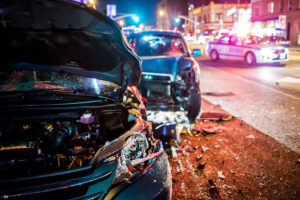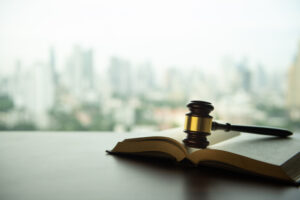Car crashes sometimes occur with a significant amount of force, causing a concussion to victims. These injuries are especially common if a driver or passenger strikes their head on a vehicle component, such as the window, headrest, or steering wheel, during the accident.
If you suffered a concussion or another traumatic brain injury (TBI) in a recent car crash, a skilled Phoenix car accident attorney in your area can explore your legal options, gather necessary medical documentation, and pursue a personal injury claim or lawsuit on your behalf. Throughout the process, your attorney will handle all communications with insurance company representatives and attend all litigation proceedings with you to pursue the full financial recovery you deserve.
Recovering Compensation for a Car Accident Concussion
Accident victims suffering a concussion may seek compensation to address the effects on their lives. However, the amount of compensation that the victim recovers through settlement or litigation will vary significantly from case to case, depending upon the following factors:

- The nature, extent, and severity of the concussion
- The total cost of the victim’s medical treatment to date
- The likelihood that the victim may need to undergo medical treatment in the future – and if so, the anticipated cost of that treatment
- Whether the case resolves via an out-of-court settlement or proceeds to a jury trial or ADR proceeding
- The likelihood that the victim will suffer ongoing complications or impairments as a result of their concussion
- The jurisdiction where the car accident case is pending
- The effect of the concussion on the victim’s ability to work
- The effect of the concussion on the victim’s overall quality of life and relationships with others
Compensation primarily reimburses medical expenses incurred due to the concussion. This includes costs associated with emergency medical care, hospital stays, diagnostic tests, medications, rehabilitation, and any ongoing treatment required for recovery.
Lost income is another important aspect of compensation. When a concussion forces the victim to take time off work for medical appointments or recovery, they can seek compensation for the income they lost during this period. Additionally, victims may pursue compensation for future income losses if the injury results in a diminished earning capacity.
Pain and suffering, categorized as non-economic damages, account for the physical and emotional distress that the victim experienced due to their concussion. This compensation recognizes the intangible toll the injury takes on the victim’s quality of life, addressing aspects such as pain, discomfort, anxiety, and loss of life enjoyment. Quantifying these non-economic damages involves presenting evidence of the injury’s effects on daily life and emotional well-being.
Property damage compensation may be relevant if the accident resulted in damage to the victim’s vehicle or personal belongings. Seeking reimbursement for repair or replacement costs ensures that the financial burden associated with property damage is adequately addressed.
In cases of permanent disability or disfigurement resulting from the concussion, victims can pursue compensation for the lasting effects on their lives. This form of compensation acknowledges the physical and emotional consequences of permanent injuries, encompassing not only the immediate aftermath but also the long-term challenges that individuals may face.
Loss of consortium, a unique category of compensation, recognizes the effects of the concussion on relationships. Spouses or family members may seek compensation for the loss of companionship, support, and intimacy resulting from the victim’s injuries.
Punitive damages, while less common, may also be available in certain circumstances. This form of compensation aims to punish the at-fault driver for particularly egregious behavior, such as intentional misconduct or gross negligence. It further serves as a deterrent and emphasizes accountability for actions that go beyond ordinary negligence.
Seeking compensation for a concussion involves addressing various aspects of the victim’s losses. From medical expenses and lost income to pain and suffering, property damage, and compensation for permanent disabilities, the ultimate goal is to provide the victims with the overall compensation they need to become whole again.
How Does a Concussion Occur in a Car Accident?
In a car crash resulting from someone else’s negligence, a concussion can occur due to the abrupt deceleration or impact that forces the accident victim’s brain to collide with their skull. This often happens when a vehicle suddenly stops, leading to the rapid forward and backward movement of the victim’s head. The brain – which is suspended within the skull – can strike the skull’s inner surface, resulting in a concussion.

During a car crash, the brain undergoes rotational forces, causing it to twist within the skull. This rotational movement can lead to the stretching and damaging of nerve fibers, including neurons and axons, contributing to the development of a concussion. Factors like the speeds of the vehicles involved, the angle of impact, and the use of seatbelts can influence the severity of the concussion.
Victims of car accidents who sustain concussions may require various types of medical treatment to address the complex nature of this injury. Initial evaluation often involves a thorough neurological examination to assess cognitive functions, coordination, and reflexes. Imaging studies such as CT scans or MRIs may be necessary to rule out more severe brain injuries and provide a clearer understanding of the concussion’s overall effect.
Rest and cognitive rest are important components of concussion treatment. This often involves limiting activities that strain the brain, including screen time, reading, or engaging in mentally demanding tasks. Adequate rest allows the brain to heal and minimizes the risk of exacerbating symptoms.
Symptom management is also essential since concussion victims may experience headaches, nausea, dizziness, and difficulty concentrating. Healthcare providers may prescribe medication to alleviate these symptoms and facilitate recovery.
Rehabilitative therapies can also play a significant role in concussion treatment. Physical therapy may address balance and coordination issues, while occupational therapy can help individuals regain everyday cognitive skills. Speech therapy may be necessary if the concussion affects the accident victim’s communication or language abilities.
Regular follow-up appointments with healthcare professionals are essential to monitor the recovery progress and adjust the treatment plan as needed. Gradual return to normal activities, including work or school, is typically recommended based on the individual’s symptom improvement.
In cases of prolonged or severe concussions, specialized care from neurologists, neuropsychologists, or concussion clinics may be necessary. These experts can provide a more tailored treatment plan for the accident victim’s full recovery.
If you or someone you love suffered a concussion in a recent car accident, a knowledgeable car accident lawyer in your area can obtain copies of your medical records and other documentation while you complete your treatment and pursue a full recovery.
Types of Car Accidents that Cause Concussions – and How These Accidents Frequently Occur
Car accidents resulting in concussions often stem from various scenarios, most of which involve another driver’s negligence. One common type is the rear-end collision, where a driver fails to maintain a safe following distance or speeds excessively. When the negligent driver strikes the vehicle in front, the sudden impact can lead to rapid head movement, causing the accident victim’s brain to collide with their skull and resulting in a concussion.
Side-impact collisions, also known as T-bone accidents, are another prevalent cause of concussions. These accidents occur when another driver fails to yield the right-of-way at intersections or disregards traffic signals, resulting in a collision with the side of another vehicle. The forceful impact can subject the occupants to rotational forces, contributing to concussions.
Similarly, rollover accidents can lead to concussions, often resulting from another driver’s reckless behavior, such as high-speed turns or abrupt maneuvers. Negligence in adhering to speed limits, failing to control the vehicle, or even manufacturing defects can contribute to the circumstances leading to a rollover accident.
Distracted driving is another common cause of car accidents, including those resulting in concussions. When a driver diverts their attention away from the road by texting, talking on the phone, or engaging in other distractions, the likelihood of collisions increases. Negligence in prioritizing safe driving practices can lead to severe accidents with the potential for TBIs like concussions.
Impaired driving, particularly driving under the influence of alcohol or drugs, is another significant contributor to car accidents causing concussions. Intoxicated drivers may exhibit reduced reaction times and impaired judgment, increasing the risk of collisions and subsequent head injuries.
Fatigued driving can also lead to car accidents and concussions. When drivers are overly tired, their ability to focus and react becomes compromised, making them more susceptible to accidents. Negligence in recognizing the signs of fatigue or failing to take breaks when needed can result in severe consequences while on the road
Whether it’s rear-end collisions, side-impact crashes, rollovers, distracted driving, impaired driving, or fatigued driving, driver negligence can lead to serious accidents and concussions. If you or someone you love suffered a concussion in a recent car crash, a local car accident lawyer can meet with you to discuss your case and take the appropriate legal steps on your behalf.
Proving the Legal Elements of a Car Accident Case Involving a Concussion
Proving the legal elements of a car accident resulting in a concussion requires a strategic approach to establish liability and seek compensation. The key legal elements include a duty of care, breach of duty, causation, and damages.

- First, duty of care refers to the responsibility people have to drive safely and adhere to traffic laws. To prove this element, it’s crucial to establish that the negligent party owed a duty to exercise reasonable care on the road. For instance, drivers must follow speed limits, obey traffic signals, and maintain a safe following distance.
- The second element involves demonstrating a breach of duty, indicating that the responsible party failed to meet the standard of care expected. This breach can involve actions like distracted driving, impaired driving, or reckless behavior. Gathering evidence such as witness statements, surveillance footage, or police reports is essential to substantiate the claim of negligence.
- Causation, the third element, requires establishing a direct link between the at-fault driver’s breach of duty and the occurrence of the concussion. It involves demonstrating that the negligent actions directly led to the car accident and subsequent TBI. Medical records, expert opinions, and accident reconstruction analyses may contribute to proving causation.
- The final element, damages, involves showcasing the tangible harm resulting from the accident, such as medical expenses, lost income, and pain and suffering. In the case of a concussion, detailed medical records indicating the diagnosis, treatment plan, and associated costs are crucial. Additionally, presenting evidence of how the injury has affected the victim’s daily life and emotional well-being supports the claim for damages.
To strengthen the case, it's essential to document the accident scene thoroughly. This includes taking photographs of vehicle damage, road conditions, and any relevant signage or signals. Eyewitness statements can provide firsthand accounts of the events leading up to the crash.
Engaging healthcare professionals who can testify to the extent of the concussion and its effect on the victim’s life adds further credibility to the claim. Medical experts can explain the connection between the car accident and the resulting TBI, assisting in establishing causation.
Successfully proving the legal elements of a car accident resulting in a concussion involves demonstrating a duty of care, breach of duty, causation, and damages. Collecting substantial evidence, from the scene of the accident to medical records and expert testimonies, is crucial in building a persuasive case and recovering favorable damages.
Litigating a Car Accident Case Involving a Concussion
Successfully litigating a car accident case involving a concussion requires a comprehensive approach. The process involves several key steps aimed at proving negligence, establishing causation, and securing rightful compensation for the victim.
First, gathering compelling evidence is crucial. This includes police reports, witness statements, and any available surveillance footage. The goal is to build a solid foundation that clearly illustrates the other driver’s negligence, whether it be due to distracted driving, impaired driving, or any other breach of their duty to exercise reasonable care while on the road.
Engaging medical professionals is also essential. Detailed documentation of the victim’s concussion diagnosis, treatment plan, and associated costs strengthens the case. Expert testimony from healthcare professionals can provide valuable insights into causation, explaining how the car accident directly led to the TBI.
Accident reconstruction experts may also play a crucial role in illustrating the sequence of events that resulted in the crash and subsequent concussion. Their analyses can help to establish a causal link between the at-fault driver’s actions and the injuries sustained.
Timely and thorough communication with the insurance company is also important. Presenting the evidence methodically, supported by medical records and expert opinions, can encourage the insurer to negotiate a fair settlement. Skilled negotiation involves aggressively advocating for the victim’s rights and demonstrating the strength of the case.
If pre-litigation negotiations prove insufficient, filing a lawsuit becomes the next step. Crafting a compelling complaint outlining the legal claims, backed by the gathered evidence, begins the formal legal proceedings. Serving this document to the responsible party formally starts the litigation process.
Throughout litigation, maintaining a clear and persuasive narrative is essential. Presenting the evidence coherently during discovery, which includes sharing information, documents, and witness statements with the opposing party, ensures transparency. Depositions, where witnesses provide sworn testimony, further contribute to building a strong car accident case.
Preparing for trial is another critical aspect of successful litigation. This involves refining legal arguments, preparing witnesses, and anticipating the opposing party’s in-court strategies. The trial itself provides the opportunity to present the evidence before a judge and jury, seeking a favorable verdict that holds the negligent driver accountable.
Successfully litigating a car accident case involving a concussion requires a combination of legal experience, medical support, and advocacy. By carefully following these steps, your car accident lawyer can navigate the legal system, prove negligence, establish causation, and secure the compensation you deserve for your concussion.
Speak with an Experienced Car Accident Attorney Today

Concussions resulting from a car accident can bring about permanent cognitive impairments, memory losses, and other lifetime complications. If you or a person you love suffered a concussion due to someone else’s negligence, a car accident lawyer in your area can take the necessary legal steps on your behalf.
Specifically, your lawyer may file a personal injury claim with the at-fault driver’s insurance company or pursue litigation in the court system by taking your case to trial or alternative dispute resolution (ADR). No matter how your case proceeds, your lawyer will do everything possible to maximize the compensation award you receive for your concussion and its aftermath.